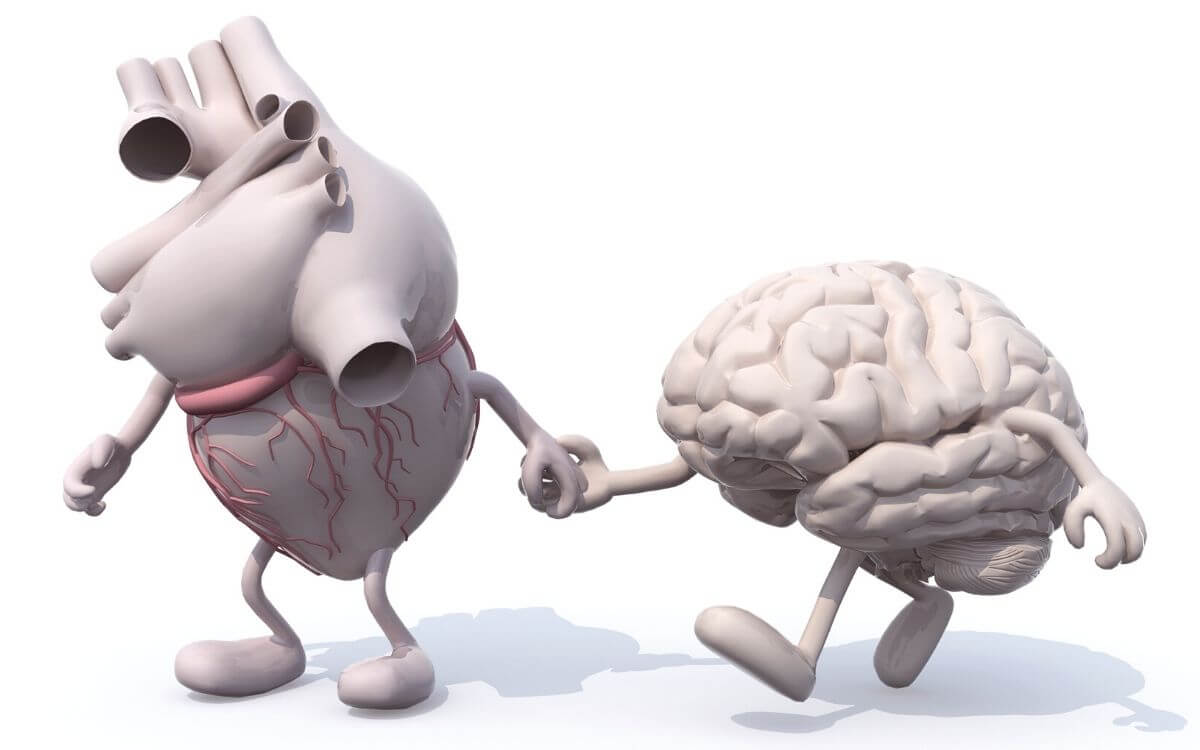Logic vs Emotions.
Logic vs emotions. Before we talk about stress and its impact on the way we think, I’d like to say a few words for those who don’t know me…
Hi, I created Worry Head along with my wife “M” who’s the contributor. If you want to get to know who we are, the “About” page is the best place to visit. Until then, enjoy this rather lengthy article.
All our posts consist of an average of about 4500 words each and are a minimum of 20-25 mins read. There are exceptions such as the endometriosis article made up of epic 7500 words. We want to give more value to our readers!
In today’s post, I’d like to tackle a subject that is very important in our life, the decision-making process…
Stress vs excitement!
The way we think impacts our lives in a good or bad way. Logic gives us calculated decisions but emotions give us risky and unexpected responses. Stress impacts the way we think. On top of that, it affects other areas in our body, our performance at work, and even family life.
Our feelings are very important, but they can affect our physical well-being as well as our minds.
While humans should make logical choices, they largely base what they know and decide on their emotions, memories, opinions, and life experiences.
How we react to stress matters. If we set our mindset on the path of thinking things such as “it’s going to be a hassle today for me at work” or “if I expect there’s going to be lots of pressure”, or “if I expect to get stressed every time I get in that traffic jam and I can’t cope with that expectations”, we will fail to control our emotions.
Stress is needed in our life, in order to perform better. It’s not possible to be able to control the crowd or what the TV is saying about you.
We can’t always control situations that we find ourselves in, but we can always control our response mindset to define our performance.
Stress can be seen as something very positive and at the same time stress can drive success instead of becoming a hindrance. It’s all to do with the way we learn to control our emotions.
Logic vs emotions matters. It can make a loud clear difference between performance and failure.
Emotions are shortcuts built by the brain because naturally, we don’t really have the time to draw up a list while standing in the aisle of a grocery store, instead, we allow our emotions to take over and guide the process.
In other words, emotions are the first step in the decision-making process. But they aren’t the last ones!

Decisions.
Logic comes in when you rationalize the decision that you want to make. An example would be reaching for the same brand of kitchen towel as your mum used to buy. So subconsciously you will make that decision because that brand of kitchen towel worked well for your mum.
On the other hand, occasionally, logic can win over emotions for larger decisions. You would love to buy a beautiful and expensive car because you’ve loved them since you were a kid. This is why the subject of logic vs emotions interested me.
They look impressive and make you feel proud but it makes no sense if you think about it. It’s expensive, it would be a liability to pay for big insurance. More sense is to buy a cheap car. Logic wins out.
Together, emotions and logic pair up to become a decision-making process. Sporadically logic takes over but most of the time it is our feelings that take control. This is when logic vs emotions battle takes place.
Think about Facebook for instance. People care about what others think of them knowing they should simply leave the platform. They feel they need to stay on it and lie about what their life really looks like, in order to be more likable!
Emotions might be unpredictable, personal, and frustrating but they are more powerful than any logical explanation.
We are constantly trying to figure out, how to make decisions, that serve us well each and every day. Why do emotions overpower us? Because emotions are very powerful and take the lead.
Have you ever made plans to change a habit in your life? It’s difficult because emotions take over. Emotions have much weight to them because they’re charged with feelings.
We experience both logic and emotion, and our experience hinges on several external and internal factors.
Too often, we’re overwhelmed by the way we feel and too often, these feelings are negative. Guilt, depression, anger, resentment, jealousy, and anxiety can rule our lives if we let them.
On many occasions, my wife asks me for reassurance even though she knows, that whatever she decides it’s right. She is a very intelligent woman, but sometimes emotions take over.
She asks me questions about whether she has made the right decision and done the right thing, to reassure herself. It is not only her that does this, but also I do it from time to time! Every person needs to feel reassured.
When dealing with people, we are not dealing with creatures of logic but we are dealing with creatures of emotions.
Emotions create movement and action. Logic is a foundation of emotions. In most situations, people react based on emotions, after which they justify their actions with logic and facts.
We use logic to justify our actions to ourselves and others. People often try to persuade an emotional person with logic. In some cases, it works.
Having OCD, my wife often asked me after checking her bank account just before bedtime, if she has to do it again later on in case someone hacks her account.
I always reassured her with logic by saying, if you don’t use WiFi and you’re at home having your phone off, it is not likely that someone will hack your bank account. That was always enough to reassure her.
We think we make decisions based on facts, but it is not the case. When it comes to mental illness, the reasoning is a powerful tool for the mind. A piece of evidence makes any argument true. When you provide proof, you remove doubts that are in the other person’s mind.
It is said that emotions drive 80% of our choices and logic takes only 20%. Some people with mental illness have no insight into their behavior and their actions.
For example, when someone gets upset, no amount of calming and reassuring seems to make a difference. That was the case with my wife, whenever she had a panic attack. All she needed was 15 minutes, as it takes this amount of time to calm down.
How to help yourself?
There is no magic method. In such a situation, it’s all about awareness and having someone by your side.
If you don’t have a loved one nearby or you live by yourself, the best thing you can do is to remember, that your panic attack will soon subside. However scary, anxiety attack always goes away.
For someone with mental illness logical mind makes it hard to process emotions. My wife has a very logical mind.
She did wonderfully at school and her brain was always quick to analyze and solve problems.
But when it comes to anything within the emotional realm, she is completely lost. That’s how the brain of someone suffering from mental illness works.
My wife has struggled with depression and anxiety for her entire life. Because of that, she struggled with her emotions.
In the past, it was rare that she had a day without feeling depressed. She struggled to understand her emotions.
Emotions can be extremely overwhelming. She always questioned her decisions and tried to determine their origin in search of validation, she could make sense of it all.
Some people have serious trouble understanding where other people are coming from when they express their feelings. They may become frustrated and angry with the person who suffers from mental illness and judge them for not being able to understand. Logic vs emotions play a role.

Some emotions are so overwhelming, that they immediately trigger a fight or flight response.
For instance, my wife used to struggle to handle her anger well. The reason for it was keeping her emotions inside for a long time. We have only so much patience and no one is unbreakable.
But it is important to remember, not to make any permanent decisions for your temporary emotions!
Are you more nervous on the plane or in the car? You see, even though you know that statistically, planes are safer, your brain doesn’t overpower emotions.
Studies show that people who are able to choose logic over emotions are generally more intelligent, do better at school, and earn more. On the other hand, if you know that flying makes you anxious, it’s more rational to reduce this anxiety by driving. Even though one might use logic in this example, emotion requires less effort than logic.
So many people every day fight the same battles between logic and emotion.
I know logically I should get up early and go to bed early, I logically know that sitting on the sofa watching box sets is not going to enhance my career, but I still do it over and over again. That must be because I’m a loser or I’m weak, one might think.
No, you’re not! You’re not weak! What’s happening is you haven’t been told and universal truth, so let me repeat it to you again – when there is a battle between logic and emotion, emotion always wins.
It is possible to change our thinking patterns, but unconsciously we make decisions based on our emotions.
Here’s an example – you decide to call a friend to sit down a bit and chat because you might feel lonely or bored.
You would never say “let’s go to the movie” to someone who you just met, because the emotion tells you, that you might be rejected or that person who we want to meet can hurt us.
The Logical answer may be the safe person we know, so if you’re having a battle within yourself, subconsciously you will choose the right one.
Here’s another example, when emotion wins – you are scared to ask for a pay rise in case your boss will refuse. You might think then, that he’ll give you more trouble and work because how dare you to ask him that?
But if I go to your boss and show him what you’ve done and how valuable you are, that won’t happen.
There is nothing good or bad, but thinking makes it so. The need to decide is never-ending.
We don’t always choose the most rational option. Your rational brain knows that habits, like smoking and skipping exercise, are bad for your health.
When it comes to logic vs emotions, the emotional part of your brain sometimes overcomes this knowledge and rationalizes these bad behaviors. It tries to convince you to keep doing everything wrong for your health.
Whether an emotional brain operates out of habit or not, it’s always a powerful force, when you make decisions every day.
When you are too emotional, at the time you won’t make any rational choices, even though you know what’s best for you.
When mental illness comes to play, it may seem impossible to make a decision at all.
Dealing with life choices, especially life-changing ones can sound difficult.
Without the right information to help you rationalize, it could be overwhelming. You would be caught in a loop as you analyze and you would contemplate the pros and cons of every choice.
This is where each repetition is often being made, it can lead to developing Obsessive-Compulsive disorder. But that is being covered in our OCD article.
Logic cannot determine how important it is to earn money, whether to live alone or with the family. It cannot even determine whether to leave or commit suicide.
All the above examples are dictated by our emotions, not logic, therefore, they will always impact our mental health.

Emotional choices, logic vs emotions…
Logic, however, is used to identify the good and negative outcomes of the decision.
But the judgment lies with the emotions in order to make the final decision. So it’s true that every decision is emotional. It is also true, that after our decision is made, we need to justify it to other people and ourselves with logic.
Every decision involves a choice. We are able to respond fast to daily common decisions in an automatic way. We like to think that we are logical.
There are hundreds of decisions we make every day and we don’t do a logical think-through of every single one. Most of our decisions are made unconsciously. We aren’t even aware of this process.
You must always be suspicious of what other people say. If you ask someone a question, you might not be getting the right answer. What people tell you is the reason why they do what they do.
People need to feel something in order to decide. If you cannot feel emotions, you can’t make decisions.
Most of our mental processing is unconscious. You cannot confuse your unconscious with irrational or bad.
Most of our decision-making is unconscious but it doesn’t mean it’s wrong irrational or bad.
When being logical does not work?
Let’s take a look at our world…
Watching TV, we are constantly bombarded by bad news. Have you ever seen positive material on the BBC? I haven’t noticed it yet. People create wars and fight against themselves. Is it over religion, political views, economy, or else? All news is negative.
People watching it try and find the reason for it. They try to find the logic in all of this. But they can’t succeed. Why is that?
Because people are creatures of emotions they will always find a reason to argue their point of view. In most cases, the ego is involved in the process.
And while we are on the subject of television programs, I’d like to underline something very important, that not many people take even notice of.
What is it and why is it called “a program”?
This is where logic comes in handy. Why do you watch telly? It was designed to evoke emotions in you. To shock you, to create fear and happiness, and eventually influence action that you will take after watching it. The logic vs emotions battle continues…
So, what is the reason behind that action?
“Money”!
Whatever your reaction to an advert, it always leads to one thing – to make you buy something.
They want to sell you a car or life insurance for instance, by making you fear the unknown in your future or to create happy feelings of excitement and make you go on holiday, by purchasing it after you see a beautiful beach.
That’s my take on it. What do you think?
Recent experimental studies show that emotions can have a significant effect on the way we think, decide, and solve problems.
In one experiment different groups of participants first had to pass a manipulated intelligence test.
Their emotional state was altered by giving them feedback, that they performed excellent, poor, or on average.
Results revealed a clear effect of emotions on reasoning performance. Participants in a negative mood performed worse than participants in a positive mood.
When making a decision, emotions are very important for choosing what we gonna do. In fact, even with what we believe are logical decisions, the very point of choice is arguably always based on emotion.
When my wife questions her actions, because her Obsessive-Compulsive disorder does not allow her, she knows of the clear facts, yet her emotions take over. Allow me to give you closer detail about it…
In the past, my wife kept checking that all doors and windows were shut before going to bed or going out of the house and that all the electrical appliances and gas were turned off.
Sometimes she felt like she needed to repeat these checks 4, 8, or even 16 times.
She knew it was irrational and illogical, yet it was the emotion that drove her towards doing so and the reason for it was OCD.
If you’re anxious about something that is going on in your personal life, you might be subconsciously focused on that. Perhaps you’re worried about a health scare or you’re nervous about buying a new home.
All of this can cause you to feel anxious and make it harder to choose the right decision.
When you’re feeling nervous, you may refuse to create change or you may struggle to make decisions. As a result, your thinking is likely to be clouded.
Emotions certainly play an important role in the decision-making process. Anxiety can keep you from making a poor choice but at the same time delays the decision-making process itself.
To make balanced choices, you need to acknowledge your emotions pay closer attention to the way you feel, and recognize how those emotions may distort your thinking and influence your behavior.
I hope you enjoyed the “logic vs emotions“ post and I’d like to thank you so much for taking the time to read this article!


About Me
Hi, I’m Lucjan! The reason why I decided to create this blog was my beautiful wife, who experienced a lot of pain in life, but also the lack of information about endometriosis and fibromyalgia for men…
